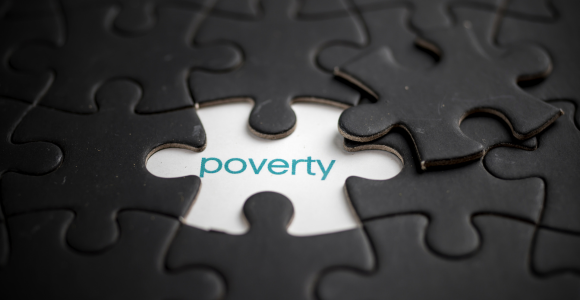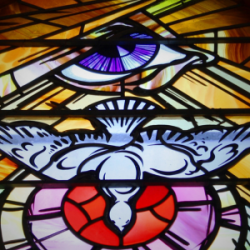
So many Christians take Jesus’ words in our reading to mean that there is nothing we can do about the inevitability of poverty. After all, Jesus says here, “The poor you will always have with you.”
However we interpret this statement, we should acknowledge its roots in the book of Deuteronomy:
At the end of every seven years you must cancel debts. This is how it is to be done: Every creditor shall cancel any loan they have made to a fellow Israelite. They shall not require payment from anyone among their own people, because the LORD’S time for canceling debts has been proclaimed. You may require payment from a foreigner, but you must cancel any debt your fellow Israelite owes you. However, there need be no poor people among you, for in the land the LORD your God is giving you to possess as your inheritance, he will richly bless you, if only you fully obey the LORD your God and are careful to follow all these commands I am giving you today. For the LORD your God will bless you as he has promised, and you will lend to many nations but will borrow from none. You will rule over many nations but none will rule over you. If anyone is poor among your fellow Israelites in any of the towns of the land the LORD your God is giving you, do not be hardhearted or tightfisted toward them. Rather, be openhanded and freely lend them whatever they need. Be careful not to harbor this wicked thought: “The seventh year, the year for canceling debts, is near,” so that you do not show ill will toward the needy among your fellow Israelites and give them nothing. They may then appeal to the LORD against you, and you will be found guilty of sin. Give generously to them and do so without a grudging heart; then because of this the LORD your God will bless you in all your work and in everything you put your hand to. There will always be poor people in the land. Therefore I command you to be openhanded toward your fellow Israelites who are poor and needy in your land. (Deuteronomy 15:1-11, emphasis added.)
This is Part 3 of the Mary, Christian Patriachy and the Existence of Poverty series.
Welcome Readers! Please subscribe to Social Jesus Here.
(Read this series from the beginning at Part 1 and Part 2.)
Notice that while there “will always be” poor people in the land, there is “no need for there to be” poor people among them. And if there are poor people among the people, they have instruction in the law on how to reverse their poverty.
The early church in the book of Acts did not take Jesus’ words as saying poverty is inevitable and there’s nothing we can do about it except for charity. They saw his words as a call to enact the principles of the book of Deuteronomy to reverse poverty.
Notice what they did:
They devoted themselves to the apostles’ teaching and to fellowship, to the breaking of bread and to prayer. Everyone was filled with awe at the many wonders and signs performed by the apostles. All the believers were together and had everything in common. They sold property and possessions to give to anyone who had need. (Acts 2:42-45)
What effect did this practice have “among them” to quote Deuteronomy?
All the believers were one in heart and mind. No one claimed that any of their possessions was their own, but they shared everything they had. With great power the apostles continued to testify to the resurrection of the Lord Jesus. And God’s grace was so powerfully at work in them all that there were no needy persons among them. For from time to time those who owned land or houses sold them, brought the money from the sales and put it at the apostles’ feet, and it was distributed to anyone who had need. (Acts 4:32-35, emphasis added)
In this instance, Jesus may have been saying it was okay for them to care for him rather than the poor . In Mark 14:7, he says “The poor you will always have with you, and you can help them any time you want. But you will not always have me.” Jesus may also have been making a proclamation against the greed of their society, saying that because they refused to follow the debt cancellation and wealth redistribution of Deuteronomy, they would “always” have people in poverty among them. However we interpret these words, we must remember that Jesus’ gospel was good news to the poor. Jesus’ politics were good news for the poor. For Jesus, the concrete, material needs of the people were holy.
“The Spirit of the Lord is on me,
because he has anointed me
to proclaim good news to the poor.
He has sent me to proclaim freedom for the prisoners
and recovery of sight for the blind,
to set the oppressed free.” (Luke 4:18, italics added)
So he replied to the messengers, “Go back and report to John what you have seen and heard: The blind receive sight, the lame walk, those who have leprosy are cleansed, the deaf hear, the dead are raised, and the good news is proclaimed to the poor.” (Luke 7:22, italics added)
To say that poverty is inevitable and there’s nothing we can do to eliminate it is not good news to the poor. It fails the litmus test here and it is contrary to the gospel of Jesus.
I close this week with two statements for us to ponder, one by the late Nelson Mandela and the other by the late Gustav Gutierrez.
Like slavery and apartheid, poverty is not natural. It is man-made and it can be overcome and eradicated by the action of human beings. (Nelson Mandela, in a 2005 speech at the Make Poverty History rally in London’s Trafalgar Square)
The poor person does not exist as an inescapable fact of destiny. His or her existence is not politically neutral, and it is not ethically innocent. The poor are a by-product of the system in which we live and for which we are responsible. They are marginalized by our social and cultural world. They are the oppressed, exploited proletariat, robbed of the fruit of their labor and despoiled of their humanity. Hence the poverty of the poor is not a call to generous relief action, but a demand that we go and build a different social order. (Gustavo Gutierrez, The Power of the Poor in History, p. 44)
Lent is about course corrections and recommitting our lives to the gospel of Jesus. This Lent, maybe one of the matters we should repent of is that poverty exists among us as Christians and as a society.
Are you receiving all of RHM’s free resources each week?
Begin each day being inspired toward love, compassion, justice and action. Free.
Sign up at HERE.



















